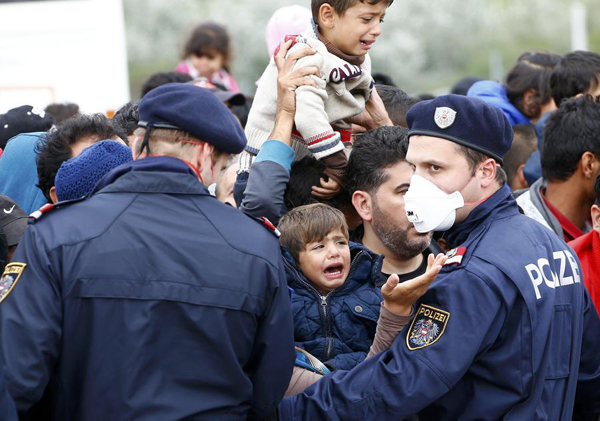Border-free Europe unravels as migrant crisis hits record day
(Agencies) Updated: 2015-09-14 22:06
ROSZKE, Hungary/VIENNA - Two decades of frontier-free travel across Europe unravelled on Monday as countries re-established border controls in the face of an unprecedented influx of migrants, which broke the record for the most arrivals by land in a single day.
Germany's surprise decision to restore border controls on Sunday had a swift domino effect, prompting neighbours to impose checks at their own frontiers as thousands of refugees pressed north and west across the continent while European Union ministers argued in Brussels over how to share the burden.
Austria said it would dispatch its military to help the police carry out checks at the border with Hungary after thousands of migrants crossed on foot overnight, filling up emergency accomodation nearby, including tents at the frontier.
Thousands more raced across the Balkans to enter Hungary before new rules take effect on Tuesday, which Budapest's right-wing government says will bring a halt to the illegal flow of migrants across its territory.
By 1400 GMT on Monday, police said 7,437 migrants had been recorded entering Hungary from Serbia, beating the previous day's record of 5,809.
Then a line of Hungarian police in helmets blocked off the main informal crossing point. Backed by mounted police and soldiers with a helicopter circling overhead, dozens of officers took up positions on a railway track used by migrants to enter the EU's Schengen zone of border-free travel.
Slovakia said it would now impose controls on its borders with Hungary and Austria. The Netherlands announced it would make spot checks at its borders. Other EU countries, ranging from Sweden to Poland, said they were monitoring the situation to decide whether controls were needed.
"If Germany carries out border controls, Austria must put strengthened border controls in place," Vice Chancellor Reinhold Mitterlehner told a joint news conference with Chancellor Werner Faymann. "We are doing that now."
He and Faymann said the army would be deployed in a supporting role.
"The focus of the support is on humanitarian help," Faymann said. "But it is also, and I would like to emphasise this, on supporting border controls where it is necessary."







